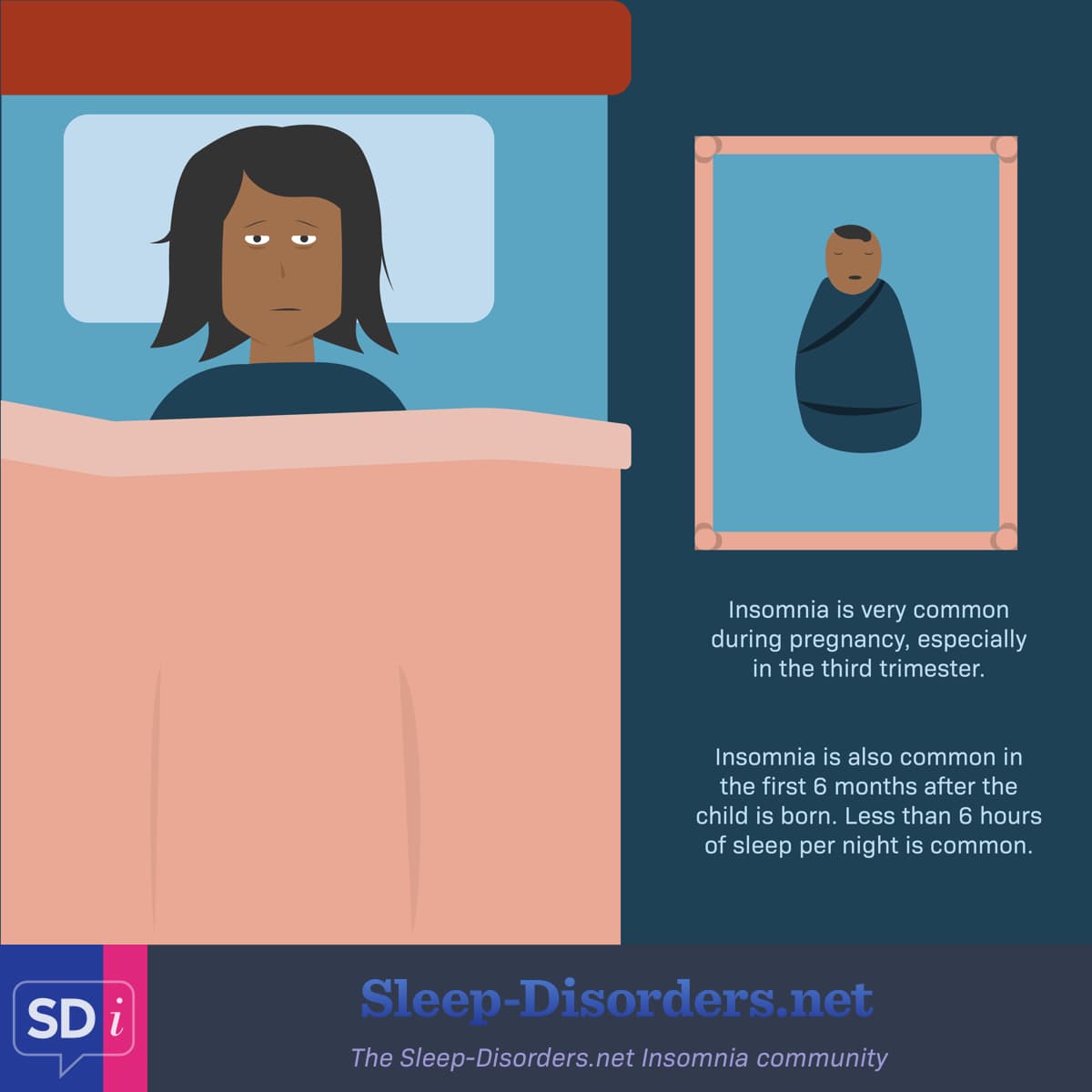Insomnia During Pregnancy and the Postpartum Period
Reviewed by: HU Medical Review Board | Last reviewed: June 2020 | Last updated: February 2021
Insomnia is very common during pregnancy, especially in the third trimester. Insomnia is diagnosed if you take more than 30 minutes to fall asleep, wake in the night and cannot get back to sleep, or wake too early and cannot get back to sleep. Some women also report getting enough sleep but not feeling refreshed when they wake up.1-2
There is no official measure for whether insomnia is considered mild, moderate, or severe. However, pregnant women generally need 7 to 9 hours of sleep each night. Insomnia can make this hard to achieve.1-2
How common is pregnancy insomnia?
One in 10 women report problems sleeping in the first trimester. That increases to 2 in 10 during the second trimester and 6 to 8 out of 10 during the third trimester. The most common complaint is difficulty staying asleep. Hormone changes just before delivery mean that almost all pregnant women wake often late in the third trimester.1-2
What causes insomnia during pregnancy and postpartum?
Pregnancy insomnia may be caused by hormone changes or the side effects of being pregnant, such as:1-3
- Back pain or leg cramps
- Heartburn
- Needing to pee at night
- The baby moving
- Shortness of breath
- Physical discomfort
- Worry about the delivery or baby
Insomnia tends to continue after delivery. Some of this is due to hormone changes and some due to the demands of infant care.2
Figure 1. Insomnia before and after delivery
Diagnosing insomnia during pregnancy
Insomnia is usually diagnosed when the mother-to-be reports sleep problems to her doctor. A sleep diary may help give the doctor an idea of how severe the insomnia is or what may be making it worse.1
Dangers of poor sleep during pregnancy
More doctors now recognize that sleep plays an important role in the health of both the mother and baby. Several studies have found that pregnant women who get less than 4 to 6 hours of sleep per night are more likely to have:1
- Gestational diabetes
- Higher blood pressure
- Preterm delivery
- Low birth-weight baby
- Increased rate of cesarean section
- Worse labor pain
- Longer labor
- More depression
One study of 457 women found that the first stage of labor lasted for 6 to 10 hours for those who slept 8 hours a night. Women who got less sleep spent more than 10 hours in the first stage of labor.1
Treatment of insomnia during pregnancy
Being treated for insomnia is important for your own health and that of your baby. There are drugs to help you sleep, but your doctor will most likely suggest non-drug alternatives first. These include:1-3
- Changing your sleep position, adding pillows
- Going to bed and waking at the same time every day
- Avoiding naps and caffeine
- If a nap is needed, it should last no more than 20-30 minutes and be taken earlier in the day
- Taking a warm bath or getting a massage before bedtime
- Using a heating pad for sore muscles
- Limiting liquids in the evening to reduce night-time trips to the bathroom
- Using relaxation techniques or meditation
- Exercising regularly
- Removing electronics from the bedroom
- Drinking warm milk or chamomile tea before bedtime
The drugs most often prescribed for insomnia include benzodiazepines (clonazepam, diazepam, or lorazepam) and hypnotic benzodiazepine receptor agonists (zaleplon, zolpidem, and eszopiclone). These drugs do not seem to cause deformities in babies but may lead to preterm labor, cesarean section, and low birthweight babies.1-2
Over-the-counter antihistamines such as Benadryl are sometimes used to help someone fall asleep. These drugs do not seem to carry a risk for the mother or baby but may cause morning grogginess or other side effects. In mothers who are depressed during pregnancy, antidepressants may help improve sleep.1
The benefits of taking drugs to sleep during pregnancy must be weighed against the risks to both mother and baby.1-2
Insomnia during the postpartum period
Insomnia is also common in the first 6 months after the child is born. Less than 6 hours of sleep per night is common. However, this usually gets better as the baby learns to sleep through the night. Women who breastfeed get more stage 3 sleep.2
Other sleep problems during pregnancy
Pregnant women also develop other sleep disorders during pregnancy such as sleep apnea or restless legs syndrome.2
